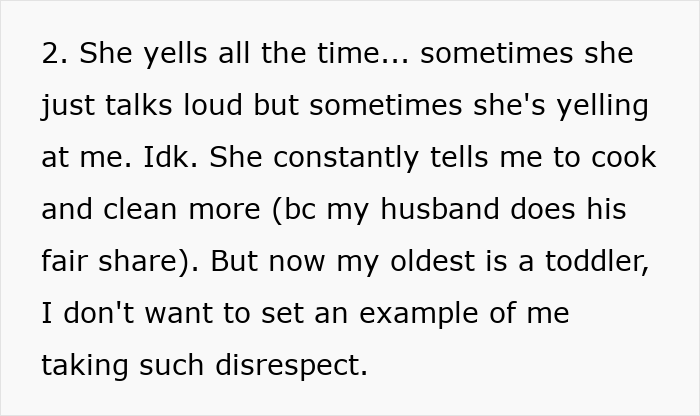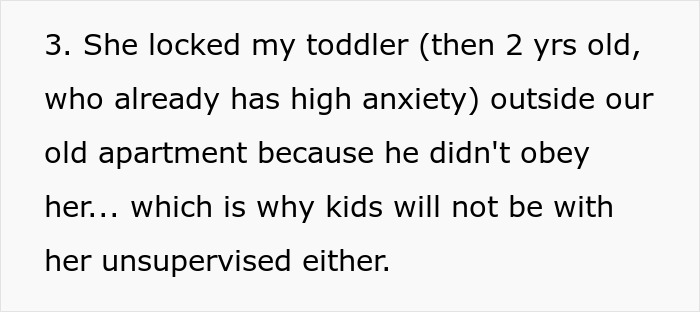It’s always comforting to be surrounded by people who love you, not just when you’re celebrating but when life throws curveballs too. But here’s the thing: expecting support while dishing out disrespect is a bit much, right?
That’s exactly the pickle one woman found herself in. Her husband wanted his mom to move in while she underwent cancer treatment. And while that sounds noble, the wife wasn’t jumping with joy. Turns out, the mother-in-law had a long history of crossing boundaries. We’re talking years of cultural clashes, sneaky behavior, and even emotional harm to their toddler. Keep reading to see how the woman dealt with the situation.
Taking care of elders is not just a responsibility, it’s a gesture of love and respect
Image credits: Zinkevych_D / envatoelements (not the actual photo)
A woman shared how she decided to move out after her rude and manipulative mother-in-law planned to move in for cancer treatment
Image credits: perfectlab / freepik (not the actual photo)
Image credits: ThrowRAMILcancer
Maintaining a healthy relationship with in-laws plays a big role in overall family harmony
Image credits: freepik (not the actual photo)
Being married doesn’t just mean saying “I do” to your partner, it often means saying “okay, fine” to their family too. In-laws come as a package deal, whether you like it or not. And when the relationship is good, it’s genuinely great—family dinners, shared traditions, a built-in babysitter, maybe. But when it’s bad? Oof. It can be stressful, suffocating, and a daily test of patience. Because love them or hate them, you can’t exactly pretend they don’t exist.
Having a healthy relationship with your in-laws is a two-way street. Everyone has to put in the effort to be kind, reasonable, and respectful. One thing that really helps is setting clear boundaries early on, like deciding what’s okay and what’s definitely not. Maybe your mother-in-law doesn’t knock before entering your room? Time to talk. Boundaries aren’t walls, they’re healthy fences. And they protect both your peace and your relationships.
One big mistake people make is trying to “fix” or change their in-laws. Spoiler alert: it rarely works. Everyone involved is an adult with their own habits, preferences, and quirks. If your father-in-law watches the news with the TV up too loud or your mother-in-law cooks everything in too much oil, take a breath. Accepting people as they are can sometimes ease the tension more than trying to correct them. You don’t have to agree, you just have to coexist peacefully.
And let’s not forget, respect goes both ways. Whether it’s a daughter-in-law or son-in-law, being polite and kind is just basic courtesy. No one wants to be insulted or criticized in their own home. It’s not about being overly formal, it’s about knowing where the line is and not crossing it. Respect isn’t about hierarchy, it’s about harmony. Everyone’s life gets better when egos take a back seat.
Arguments are bound to happen, because let’s face it, no family is perfect. But you’ve got to pick your battles. Not every minor irritation needs to turn into a full-blown feud. Is it really worth the drama over who left the lights on or how the towels are folded? Probably not. Save your energy for the bigger stuff. Like, say, someone secretly moving into your house without asking.
Sometimes, it’s just better not to take things personally. That offhand comment about your cooking? Maybe it wasn’t meant to be mean. That time they didn’t invite you to the family WhatsApp group? Okay, maybe that was shady but let it go. In-law relationships can be delicate, and getting offended by everything will only make it worse. A little grace can go a long way in keeping the peace.
Disrespect from in-laws should never be tolerated—it’s okay to set boundaries or limit interactions
Image credits: namii9 / freepik (not the actual photo)
If things are good, try to spend more quality time together as a family. It could be a movie night, a picnic, or just a Sunday meal … anything to bond outside the usual tension. Shared memories make future conflicts easier to navigate. And you never know, that cranky father-in-law might just have a great sense of humor once you get to know him. Time and shared space can turn things around—sometimes.
Empathy is your secret weapon. Try to understand where the other person is coming from, even if you disagree. Maybe your MIL nags because she’s lonely. Or your FIL criticizes because he grew up that way. You don’t have to excuse bad behavior, but understanding the root can make it easier to respond with compassion. And often, empathy calms the storm faster than confrontation.
Communication is everything. Don’t expect your in-laws to read your mind or magically know what bothers you. Speak up but gently. And be ready to listen, too. A lot of issues in families come from misunderstanding or assumptions. The more you talk (kindly), the more chances you have to fix things. Silence, on the other hand, usually makes things worse.
But let’s be real: sometimes, no matter how much you try, they’re just not supportive. That’s when it’s okay to take a step back. Limit the time spent, reduce unnecessary interaction, and protect your own space. It’s not rude, it’s necessary for mental peace. If someone drains you every time they’re around, your well-being comes first. Loving someone doesn’t mean sacrificing your sanity.
Just like in this story, where the woman chose to move out for her own peace. It wasn’t a decision made lightly, but it was one made out of self-respect. She knew her limits and took action instead of suffering silently. Do you think she did the right thing? Or would you have handled it differently? Let us know in the comments, we’d love to hear your thoughts!
The author explained more about her mother-in-law’s condition and clarified that her husband is otherwise a supportive and kind partner
Many people online encouraged the author to stand her ground and move out rather than act as caretaker for someone so inconsiderate
Thanks! Check out the results:


















0 Comments